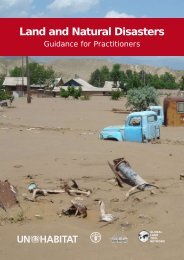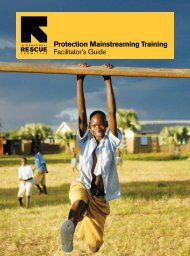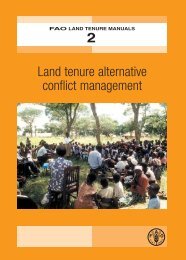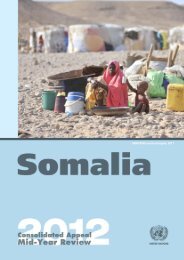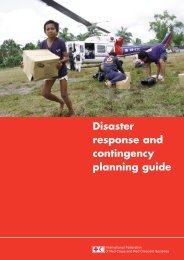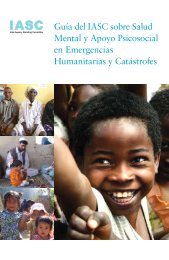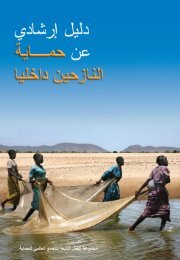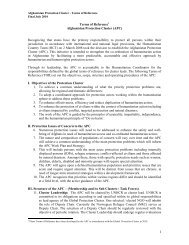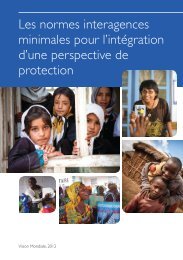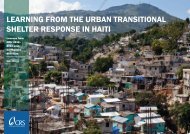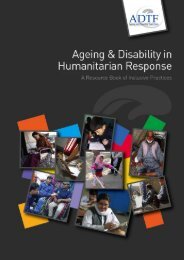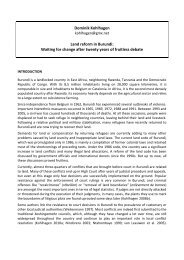Inter-Agency Real Time Evaluation of the Response to Cyclone Nargis
Inter-Agency Real Time Evaluation of the Response to Cyclone Nargis
Inter-Agency Real Time Evaluation of the Response to Cyclone Nargis
Create successful ePaper yourself
Turn your PDF publications into a flip-book with our unique Google optimized e-Paper software.
According <strong>to</strong> a recent ICG report, “[c]ommunication between <strong>the</strong> government and internationalagencies has much improved. Visas and travel permits <strong>to</strong>day are easier and faster <strong>to</strong> get than before.Requirements for <strong>the</strong> launch <strong>of</strong> new aid projects have been eased. By and large, <strong>the</strong> authorities aremaking efforts <strong>to</strong> facilitate aid, including allowing a substantial role for civil society.” 5The experience <strong>of</strong> <strong>the</strong> RTE team was entirely consistent with this observation. <strong>Inter</strong>national teammembers received both visas and travel permits within a matter <strong>of</strong> days and, once in <strong>the</strong> Delta, metwith authorities but had no restrictions placed on <strong>the</strong>ir movements or whom <strong>the</strong>y spoke <strong>to</strong>.<strong>Inter</strong>views with international staff indicated that this was consistent with <strong>the</strong>ir own experience,although restrictions reportedly remain in place in o<strong>the</strong>r parts <strong>of</strong> Myanmar.2.2 <strong>Inter</strong>-<strong>Agency</strong> <strong>Real</strong> <strong>Time</strong> <strong>Evaluation</strong>In recent years, efforts have been increasingly directed <strong>to</strong>wards improving humanitarian responsethrough learning and accountability. The <strong>Inter</strong>-<strong>Agency</strong> <strong>Real</strong> <strong>Time</strong> <strong>Evaluation</strong> (IA RTE) – endorsedby <strong>the</strong> <strong>Inter</strong>-<strong>Agency</strong> Standing Committee (IASC) Working Group in March 2007 as a one year pilot,and extended for an additional year until <strong>the</strong> beginning <strong>of</strong> 2009, is an important <strong>to</strong>ol through whichsuch analysis may be conducted. In accordance with <strong>the</strong> IASC mandate, an IA RTE on <strong>the</strong> response<strong>to</strong> <strong>Cyclone</strong> <strong>Nargis</strong> was proposed and received <strong>the</strong> consent and support <strong>of</strong> <strong>the</strong> UN Country Team andhumanitarian community in Myanmar.This IA RTE afforded <strong>the</strong> opportunity for <strong>the</strong> international humanitarian community <strong>to</strong> reflectcollectively upon <strong>the</strong> systems in place, taking in<strong>to</strong> consideration <strong>the</strong> individual capacities <strong>of</strong> agencieson <strong>the</strong> ground, as well as <strong>the</strong>ir unique strengths and challenges. It also provided an opportunity forUN and non-UN ac<strong>to</strong>rs within <strong>the</strong> international aid system <strong>to</strong> assess <strong>the</strong>ir considerable efforts,recognized and placed in <strong>the</strong> context <strong>of</strong> <strong>the</strong> overall response.The approach for this IA RTE differs in two important ways from more “traditional” evaluations.Although RTEs are potentially most effective at <strong>the</strong> early stages <strong>of</strong> a response when <strong>the</strong>y canhave <strong>the</strong> greatest influence on <strong>the</strong> humanitarian response, <strong>the</strong> team approached this exerciseon <strong>the</strong> assumption that an IA RTE can also be effective at times <strong>of</strong> programme transition.While it was seen <strong>to</strong> be necessary for <strong>the</strong> IA RTE team <strong>to</strong> develop a good understanding <strong>of</strong>emergency phase <strong>of</strong> <strong>the</strong> response, <strong>the</strong> primary focus was on <strong>the</strong> “here and now” - i.e. <strong>the</strong>current status <strong>of</strong> <strong>the</strong> recovery and rehabilitation phase. The IA RTE team began its work fivemonths after cyclone <strong>Nargis</strong> made landfall in Myanmar and <strong>the</strong> focus <strong>of</strong> this IA RTE was <strong>to</strong>guide <strong>the</strong> international humanitarian community in making appropriate adjustments in <strong>the</strong>iractivities related <strong>to</strong> cyclone <strong>Nargis</strong> over <strong>the</strong> succeeding months <strong>to</strong> improve overall qualityand accountability, ra<strong>the</strong>r than only aiming <strong>to</strong> capture learning for use in future responses.<strong>Evaluation</strong>s typically look a specific project or program. The IA RTE is an interagencyexercise and, as with most o<strong>the</strong>r joint evaluations, is best suited <strong>to</strong> capturing learning aroundhow humanitarian ac<strong>to</strong>rs have been coordinating/collaborating <strong>to</strong>ge<strong>the</strong>r and assessing <strong>the</strong>collective outcomes <strong>of</strong> <strong>the</strong>ir activities. While references may be made <strong>to</strong> individual agenciesin <strong>the</strong> report ei<strong>the</strong>r for illustrative purposes or because <strong>the</strong> team felt that <strong>the</strong>re were particularimpacts on <strong>the</strong> broader response, <strong>the</strong> IA RTE is intended <strong>to</strong> support, ra<strong>the</strong>r than replaceevaluations and reviews commissioned by individual agencies, clusters, etc. <strong>to</strong> assess <strong>the</strong>irindividual operational performance.5 Burma/Myanmar After <strong>Nargis</strong>: <strong>Time</strong> <strong>to</strong> Normalise Aid Relation, Asia Report N°161 – 20 Oc<strong>to</strong>ber 200813



